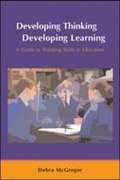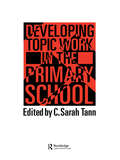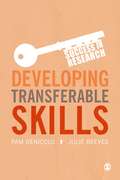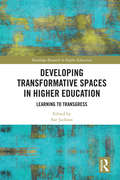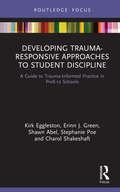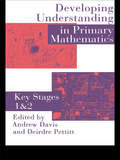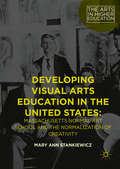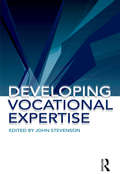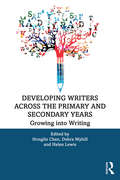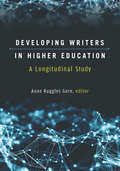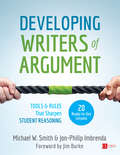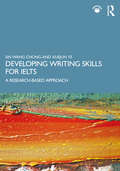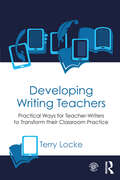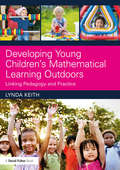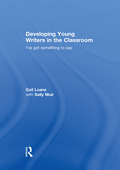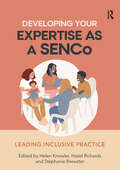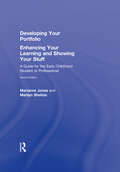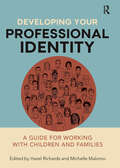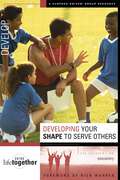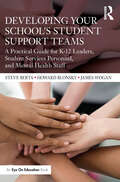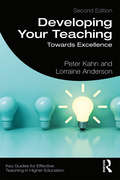- Table View
- List View
Developing Thinking; Developing Learning: A Guide to Thinking Skills in Education
by Debra McgregorThis is an indispensable guide to thinking skills in schools today, and is key reading for education studies students, teachers and trainee teachers, and educational psychologists.
Developing Topic Work In The Primary School
by C. Sarah TannFirst published in 1988. Routledge is an imprint of Taylor & Francis, an informa company.
Developing Transferable Skills: Enhancing Your Research and Employment Potential (Success in Research)
by Julie Reeves Pam Denicolo'PhD students and young researchers increasingly find employment outside the world of education. This book is an excellent guide to the skills they will need as they make that move.' - Professor Nigel Vincent, Vice-President for Research & HE Policy, The British Academy 'This book should be required reading for researchers embarking on a research career, particularly those on doctoral training programmes, and academics in their roles as supervisors or managers of researchers.' - Dr Janet Metcalfe, Chair and Head Vitae This book provides a succinct guide for doctoral and early career researchers about the nature of transferable skills, why they are needed and how they can be acquired, evidenced and marketed. In the UK, possession of a doctorate is no longer the rarity it once was and the competitive economic climate makes it even more critical that doctoral graduates and early career researchers can convince prospective employers of both their specialist and generic skills. In this context, institutions are also required to provide well organised, relevant training in skills development if they are to attract and retain doctoral candidates. Thus, the book also has value for those charged with developing the transferable skills of others. With coverage of project management, team working, communication, leadership and technical skills, this book is an essential guide for researchers who want to make the most of the skills you have and acquire the skills they need. The authors' work engages them daily in the development of researchers' skills and they made a substantial contribution to the development of Vitae's Researcher Development Framework. The Success in Research series, from Cindy Becker and Pam Denicolo, provides short, authoritative and accessible guides on key areas of professional and research development. Avoiding jargon and cutting to the chase of what you really need to know, these practical and supportive books cover a range of areas from presenting research to achieving impact, and from publishing journal articles to developing proposals. They are essential reading for any student or researcher interested in developing their skills and broadening their professional and methodological knowledge in an academic context.
Developing Transformative Spaces in Higher Education: Learning to Transgress (Routledge Research in Higher Education)
by Sue JacksonHigher education has been presented as a solution to a host of local and global problems, despite the fact that learning and assessment can also be used as mechanisms for exclusion and social control. Developing Transformative Spaces in Higher Education: Learning to Transgress demonstrates that even when knowledge may appear to be the solution, it can be partial and disempowering to all but the dominant groups. The book shows the need to contest such knowledge claims and to learn to transgress, rather than to conform. It argues that transformative spaces need to be found and that these should be about the creation of new opportunities, ways of knowing and ways of being. Working in and through spaces of transgression, the contributors to this volume develop frameworks for the possibilities of transformative spaces in learning and teaching in higher education. The book critiques the ways in which Western higher education culture determines the academic agenda in relation to dialogue on social differences, minority groups and hierarchical structures, including issues of representation among different groups in the population. It also explores the personal and political costs of transgression and outlines ways in which transitions can be transformative. The book should be of interest to academics, researchers and postgraduate students engaged in the study of higher education, education studies, teacher training, social justice and transformation. It should also be essential reading for practitioners working in post-compulsory education.
Developing Trauma-Responsive Approaches to Student Discipline: A Guide to Trauma-Informed Practice in PreK-12 Schools (Routledge Research in Education)
by Charol Shakeshaft Kirk Eggleston Erinn J. Green Shawn Abel Stephanie PoeBuilding on comprehensive research conducted in US schools, this accessible volume offers an effective model of school leadership to develop and implement school-wide, trauma-responsive approaches to student discipline. Recognizing that challenging student behaviours are often rooted in early experiences of trauma, the volume builds on a model from the Substance Abuse and Mental Health Services Administration (SAMHSA) to walk readers through the processes of realizing, recognizing, responding to, and resisting the impacts of trauma in school contexts. Research and interviews model an educational reform process and explain how a range of differentiated interventions including Positive Behaviour Interventions and Supports (PBIS), social-emotional learning (SEL), restorative justice, and family engagement can be used to boost student resilience and pro-social behaviour. Practical steps are supported by current theory, resources, and stories of implementation from superintendents, principals, and teachers. This text will benefit school leaders, teachers, and counsellors with an interest in restorative student discipline, emotional and behavioural difficulties in young people, and PreK-12 education more broadly. Those interested in school psychology, trauma studies, and trauma counselling with children and adolescents will also benefit from the volume.
Developing Trauma-Responsive Approaches to Student Discipline: A Guide to Trauma-Informed Practice in PreK-12 Schools (Routledge Research in Education)
by Charol Shakeshaft Kirk Eggleston Erinn J. Green Shawn Abel Stephanie PoeBuilding on comprehensive research conducted in US schools, this accessible volume offers an effective model of school leadership to develop and implement school-wide, trauma-responsive approaches to student discipline.Recognizing that challenging student behaviours are often rooted in early experiences of trauma, the volume builds on a model from the Substance Abuse and Mental Health Services Administration (SAMHSA) to walk readers through the processes of realizing, recognizing, responding to, and resisting the impacts of trauma in school contexts. Research and interviews model an educational reform process and explain how a range of differentiated interventions including Positive Behaviour Interventions and Supports (PBIS), social-emotional learning (SEL), restorative justice, and family engagement can be used to boost student resilience and pro-social behaviour. Practical steps are supported by current theory, resources, and stories of implementation from superintendents, principals, and teachers. This text will benefit school leaders, teachers, and counsellors with an interest in restorative student discipline, emotional and behavioural difficulties in young people, and PreK-12 education more broadly. Those interested in school psychology, trauma studies, and trauma counselling with children and adolescents will also benefit from the volume.
Developing Understanding In Primary Mathematics: Key Stages 1 & 2
by D. PettittFirst Published in 1994. Routledge is an imprint of Taylor & Francis, an informa company.
Developing Visual Arts Education in the United States
by Mary Ann StankiewiczThis bookexamines how Massachusetts Normal Art School became the alma mater par excellencefor generations of art educators, designers, and artists. The founding myth ofAmerican art education is the story of Walter Smith, the school's firstprincipal. This historical case study argues that Smith's students formed theprofessional network to disperse art education across the United States,establishing college art departments and supervising school art for industrialcities. As administrative progressives they created institutions and set normsfor the growing field of art education. Nineteenth-century artists argued thatanyone could learn to draw; by the 1920s, every child was an artist whosecreativity waited to be awakened. Arguments for systematic art instructionunder careful direction gave way to charismatic artist-teachers who sought torelease artistic spirits. The task for art education had been redefined interms of living the good life within a consumer culture of work and leisure.
Developing Vocational Expertise: Principles and issues in vocational education
by John StevensonAn ambitious book with a number of excellent chapters. It will stand out in the broad field of vocational education and training for its strong basis in the research literature.Professor Michael Young, London Institute of EducationDeveloping Vocational Expertise offers a systematic foundation for vocational education and training. Drawing on current research, it provides a theoretical basis for teachers and trainers to develop instructional strategies.The contributors emphasise the importance of considering learning in context. They examine the core areas of literacy, numeracy, information literacy, problem-solving and creativity, as well as newer areas of instruction: flexible learning and guided learning.Each chapter takes a structured approach to developing core sets of knowledge and skills for work. Within each area of expertise, recent theoretical and research developments are outlined, and the implications for curriculum development, teaching and learning are explained. Teachers and trainers are encouraged to select an appropriate combination of approaches to suit the particular needs of their students and circumstances.Developing Vocational Expertise is an essential resource for students in vocational and occupational education, and will also interest technical and further education teachers and industry trainers.
Developing Writers Across the Primary and Secondary Years: Growing into Writing
by Helen Lewis Debra Myhill Honglin ChenWriting development and pedagogy is a high priority area, particularly with standardised testing showing declines in writing across time and through the years of schooling. However, to date there are relatively few texts for teachers and teacher educators which detail how best to enable the children to become confident, autonomous and agentic writers of the future. Developing Writers Across the Primary and Secondary Years provides cumulative insights into how writing develops and how it can be taught across years of compulsory schooling. This edited collection is a timely and original contribution, addressing a significant literacy need for teachers of writing across three key stages of writing development, covering early (4-7 years old), primary (7-12 years old) and secondary years (12-16 years old) in Anglophone countries. Each section addresses two broader themes — becoming a writer with a child-oriented focus and writing pedagogy with a teacher-oriented focus. Together, the book brings to bear rigorous research and deep professional understanding of the writing classroom. It offers a novel approach conceiving of writing development as a dynamic and multidimensional concept. Such an integrated interdisciplinary understanding enables pedagogical thinking and development to address more holistically the complex act of writing.
Developing Writers in Higher Education: A Longitudinal Study (Sweetland Digital Rhetoric Collaborative)
by Anne R GereFor undergraduates following any course of study, it is essential to develop the ability to write effectively. Yet the processes by which students become more capable and ready to meet the challenges of writing for employers, the wider public, and their own purposes remain largely invisible. Developing Writers in Higher Education shows how learning to write for various purposes in multiple disciplines leads college students to new levels of competence. This volume draws on an in-depth study of the writing and experiences of 169 University of Michigan undergraduates, using statistical analysis of 322 surveys, qualitative analysis of 131 interviews, use of corpus linguistics on 94 electronic portfolios and 2,406 pieces of student writing, and case studies of individual students to trace the multiple paths taken by student writers. Topics include student writers’ interaction with feedback; perceptions of genre; the role of disciplinary writing; generality and certainty in student writing; students’ concepts of voice and style; students’ understanding of multimodal and digital writing; high school’s influence on college writers; and writing development after college. The digital edition offers samples of student writing, electronic portfolios produced by student writers, transcripts of interviews with students, and explanations of some of the analysis conducted by the contributors. This is an important book for researchers and graduate students in multiple fields. Those in writing studies get an overview of other longitudinal studies as well as key questions currently circulating. For linguists, it demonstrates how corpus linguistics can inform writing studies. Scholars in higher education will gain a new perspective on college student development. The book also adds to current understandings of sociocultural theories of literacy and offers prospective teachers insights into how students learn to write. Finally, for high school teachers, this volume will answer questions about college writing.
Developing Writers of Argument: Tools and Rules That Sharpen Student Reasoning (Corwin Literacy)
by Michael W. Smith Jon-Philip ImbrendaThe ability to make effective arguments is not only necessary in students’ academic lives, it’s a transferable skill that’s essential to students’ future success as critical thinkers and contributing members of society. But in the here and now, how do we engage students and ensure they understand argument writing’s fundamental components? How do we take them from "Here’s what I think" to "Here’s what I think. Here’s what makes me think that. And here’s why it matters"? This stunning, full-color book by Michael Smith and Jon-Philip Imbrenda shows the way, with ready-to-implement lessons that make argument writing topical and relevant. Students are first asked to form arguments about subjects that matter to them, and then to reflect on the structure of those arguments, a process that provides learners with valuable, reusable structural models. Throughout the book, the authors provide helpful instructional tools, including Literary, nonfiction, and author-created simulated texts that inspire different points of view Essential questions to create a context that rewards argumentation Lessons introducing students to the three essential elements of an argument—claim, data, and warrant—and how to make each effective Questioning probes, semantic differential scales, and other innovative instructional approaches Samples of writing from the authors’ own students, and enlightening details on how this work informed the authors’ subsequent teaching approach Complete with guidance on applying the lessons’ techniques in a broader, unit-wide context, Developing Writers of Argument offers a practical approach for instructing students in this crucial aspect of their lifelong development.
Developing Writers of Argument: Tools and Rules That Sharpen Student Reasoning (Corwin Literacy)
by Michael W. Smith Jon-Philip ImbrendaThe ability to make effective arguments is not only necessary in students’ academic lives, it’s a transferable skill that’s essential to students’ future success as critical thinkers and contributing members of society. But in the here and now, how do we engage students and ensure they understand argument writing’s fundamental components? How do we take them from "Here’s what I think" to "Here’s what I think. Here’s what makes me think that. And here’s why it matters"? This stunning, full-color book by Michael Smith and Jon-Philip Imbrenda shows the way, with ready-to-implement lessons that make argument writing topical and relevant. Students are first asked to form arguments about subjects that matter to them, and then to reflect on the structure of those arguments, a process that provides learners with valuable, reusable structural models. Throughout the book, the authors provide helpful instructional tools, including Literary, nonfiction, and author-created simulated texts that inspire different points of view Essential questions to create a context that rewards argumentation Lessons introducing students to the three essential elements of an argument—claim, data, and warrant—and how to make each effective Questioning probes, semantic differential scales, and other innovative instructional approaches Samples of writing from the authors’ own students, and enlightening details on how this work informed the authors’ subsequent teaching approach Complete with guidance on applying the lessons’ techniques in a broader, unit-wide context, Developing Writers of Argument offers a practical approach for instructing students in this crucial aspect of their lifelong development.
Developing Writing Skills for IELTS: A Research-Based Approach
by Sin Wang Chong Xuejun YeAn essential companion for IELTS writing instructors and students, Developing Writing Skills for IELTS provides IELTS test-takers with the necessary skills to succeed in the two academic writing tasks in IELTS. Adopting an original exemplar-based writing instructional approach, this text offers an in-depth and reader-friendly analysis of the assessment standards of the two academic writing tasks in IELTS. Authentic exemplars written by EFL university students are included to illustrate high (Bands 8–9), average (Bands 6–7), and low (Bands 4–5) performances in IELTS writing. Key Features: • Diagrammatical representation of assessment standards of the two academic writing tasks by experienced IELTS writing examiners and instructors. • 100 writing questions modelled after the IELTS format, designed by the authors, and categorised according to question types and topics that emerge from an analysis of over 400 IELTS writing questions. • Over 100 writing exemplars by EFL university students, accompanied by guided activities and suggested answers. Designed as a classroom text, a resource for workshops and consultations, or a self-study material, Developing Writing Skills for IELTS: A Research-based Approach will support IELTS writing instructors and test-takers with a variety of writing proficiencies.
Developing Writing Teachers: Practical Ways for Teacher-Writers to Transform their Classroom Practice
by Terry LockeThe premise of Developing Writing Teachers is this: When teachers of writing identify as writers, it adds a special dimension to their writing pedagogy. Practical and accessible while drawing on a range of relevant research and theory, this text is distinguished by its dual focus—on teachers as writers and the teaching of writing. Part I addresses the question, What does it take for a teacher of writing to develop an identity as writer? Using case studies and teacher narratives, it guides readers to an understanding of the current status of writing as the 21st century unfolds, the role of expressive writing in developing a writing identity, the relationship of writing to genre and rhetoric, writing and professional identity, and writing as design. Part II focuses on pedagogical practice and helping writer-teachers develop a toolkit to take into their classrooms. Coverage includes building a community of writing practice; the nature of writing as process; the place of grammar; the role of information, communication and representational technologies; and how assessment, properly used, can help develop writing. Ideal for for pre-service and in-service courses on the teaching of writing, the Companion Website provides aadditional readings/documents; PowerPoint presentations; assessment resources; and lesson and unit plans and planning guides.
Developing Young Children’s Mathematical Learning Outdoors: Linking Pedagogy and Practice
by Lynda KeithDeveloping Young Children’s Mathematical Learning Outdoors provides detailed guidance and practical advice on planning mathematical experiences for young children outdoors. By examining the key features of a mathematically rich outdoor environment, it illustrates how this can motivate children in leading their own learning and mathematical thinking.Drawing upon the author’s wealth of experience, the book provides support for students and early years' practitioners in developing a deeper understanding of how to plan quality experiences, which combine pedagogy with effective practice. Covering all aspects of mathematics, it identifies meaningful contexts and shows how adults can use open-ended questions and prompts to promote children’s mathematical play outside.With rich case studies and reflective questions included throughout, as well as suggestions for useful resources to put the ideas in the book into practice, it is essential reading for all those that want to develop curious and creative mathematical thinkers in the early years.
Developing Young Writers in the Classroom: I've got something to say
by Gail LoaneEducators want young people to grow up knowing that writing is an important and deeply satisfying life skill, one that helps them make more sense of themselves and their world, and one that helps them to communicate effectively. Sadly, too often writing becomes merely an exercise in ‘getting words right’, or writing to teacher-prescribed tasks. Developing Young Writers in the Classroom explores the principles of developing literacy through authorship, allowing children to describe, question and celebrate their own experiences and personal creativity. The book offers detailed guidance, supported by planning documents, poetry and prose, examples of children’s work and stimulating visuals. Inspiring topics explored include: creating a classroom environment which supports an independent writer students’ lives brought into the classroom finding significance in our experiences the use of memoir for recording experiences description in all kinds of writing choosing and writing about a character writing in all curriculum areas linking reading and writing using other authors as mentors and teachers collaborative learning. Illustrated throughout with accessible activities and ideas from literature and poetry, Developing Young Writers in the Classroom is an essential resource for all teachers wishing to inspire writing in the classroom.
Developing Your Expertise as a SENCo: Leading Inclusive Practice
by Helen Knowler Hazel Richards Stephanie BrewsterThis book equips SENCOs and aspiring SENCOs to engage in high level continuing professional development activity associated with studying for mandatory qualifications, and supports critical and innovative practice and career progression.Written by a multi-disciplinary team, it embraces sociological, medical and post-modern perspectives. It will be of interest to researchers and practitioners as it also critiques current theory, legislation, policy and research and how these can be transferred into settings. The book considers issues that SENCo's will experience both in their role and as part of this professional development, identifying the complexity of issues they have to consider and priorities in their role.A range of pedagogic and interactive features are used to support the development of study skills when working at postgraduate level such as: research and literature searching; knowledge building and skills development in SENCo; the ability to galvanise change in their context including difficult and respectful conversations about SEN provision and the development of leadership skills. This book is unique in its link between the academic and professional dimensions of the mandatory qualification - a bridge between engaging in CPD and practice of the SENCo role.
Developing Your Portfolio - Enhancing Your Learning and Showing Your Stuff: A Guide for the Early Childhood Student or Professional
by Marianne Jones Marilyn SheltonPortfolios have often been used as a way for teachers to monitor and assess their students' progress, but this book picks up on the current trend of using portfolios to assess teachers themselves as part of their degree requirements. As a professional development tool, portfolios are also useful for classroom teachers in evaluating their practice, and in showcasing their skills and accomplishments for use in interviews.Veteran teacher educators Marianne Jones and Marilyn Shelton provide practical and comprehensive guidance specific to the needs of pre- and in-service teachers of young children. This thoroughly revised and updated new edition features: A flexible and friendly approach that guides students at varying levels of experience through the portfolio process. New material on the portfolio planning stage and additional coverage on the importance of developing a personal philosophy. A companion website with additional instructor materials such as printable templates, exercises for improving portfolio skills, and more. Both theoretical and practical, the book addresses issues and mechanics related to process and product, instruction and guidance techniques, the role of reflection, and assessment strategies. With concrete examples, rubrics, tips, and exercises, this book will provide a step-by-step guide to creating a professional teaching portfolio.
Developing Your Portfolio - Enhancing Your Learning and Showing Your Stuff: A Guide for the Early Childhood Student or Professional
by Marianne Jones Marilyn SheltonPortfolios have often been used as a way for teachers to monitor and assess their students' progress, but this book picks up on the current trend of using portfolios to assess teachers themselves as part of their degree requirements. As a professional development tool, portfolios are also useful for classroom teachers in evaluating their practice, and in showcasing their skills and accomplishments for use in interviews.Veteran teacher educators Marianne Jones and Marilyn Shelton provide practical and comprehensive guidance specific to the needs of pre- and in-service teachers of young children. This thoroughly revised and updated new edition features: A flexible and friendly approach that guides students at varying levels of experience through the portfolio process New material on the portfolio planning stage and additional coverage on the importance of developing a personal philosophy A companion website with additional instructor materials such as printable templates, exercises for improving portfolio skills, and more Both theoretical and practical, the book addresses issues and mechanics related to process and product, instruction and guidance techniques, the role of reflection, and assessment strategies. With concrete examples, rubrics, tips, and exercises, this book will provide a step-by-step guide to creating a professional teaching portfolio.
Developing Your Professional Identity: A guide for working with children and families
by Hazel Richards Michelle MalomoA reflective guide for all those studying for the range of professional disciplines within the area of children and families. Written by a multi-disciplinary team, this book provides students and practitioners with opportunities to reflect upon work-based placement challenges and solutions within a variety of settings, supporting employability and the development of a professional identity. Practical and practice-based, it addresses issues of self-confidence, voice and agency, resilience and self-care, relationships and partnerships, risk assessments and reflective practice, all within the context of children and families. Chapters take a supportive and reflective approach, including clear objectives, case studies, critical questions and spotlights on new debates, helping to build essential skills and promoting a clear sense of self as individuals transition from student to professional.
Developing Your SHAPE to Serve Others: Six Sessions on Ministry (Doing Life Together)
by Brett EastmanThe way you’re wired is no accident! God designed your unique mix of gifts, natural abilities, personality, values, and life experiences to play an essential part in his kingdom. These six sessions will help you develop your God-given design at home, at work, at church, and in your community in a way that extends God’s love to others and enriches your own life immeasurably. “Doing Life Together is a groundbreaking study…[It’s] the first small group curriculum built completely on the purpose-driven paradigm…The greatest reason I’m excited about [it] is that I’ve seen the dramatic changes it produces in the lives of those who study it.” —From the foreword by Rick Warren Based on the five biblical purposes that form the bedrock of Saddleback Church, Doing Life Together will help your group discover what God created you for and how you can turn this dream into an everyday reality. Experience the transformation firsthand as you begin Connecting, Growing, Developing, Sharing, and Surrendering your life together for him.
Developing Your School’s Student Support Teams: A Practical Guide for K-12 Leaders, Student Services Personnel, and Mental Health Staff
by Steve Berta Howard Blonsky James WoganDeveloping Your School’s Student Support Teams is a practical manual for schools seeking to establish and sustain coordinated teams in support of students’ social, emotional and behavioral health. Every day, students struggle with a range of issues, including traumas, that complicate their learning, engagement, and overall well-being. School psychologists, counselors, social workers and nurses are employed in many school districts, but their schedules often make it difficult to collaborate effectively in developing and implementing comprehensive intervention plans. This book promotes teamwork throughout schools by exploring how interdependent practitioners can come together at the appropriate levels and times to help coordinate school and community resources. This "filtering" process will guide K-12 leaders and service professionals toward systems and decision-making that enable long-term student supports, accurate identification of systemic learning barriers, improved school culture and climate, attention to diverse populations, and more. With these proactive teamwork strategies, school staff will be better prepared to share workload and accountability and to identify and build upon the existing strengths and supports of every student.
Developing Your School’s Student Support Teams: A Practical Guide for K-12 Leaders, Student Services Personnel, and Mental Health Staff
by Steve Berta Howard Blonsky James WoganDeveloping Your School’s Student Support Teams is a practical manual for schools seeking to establish and sustain coordinated teams in support of students’ social, emotional and behavioral health. Every day, students struggle with a range of issues, including traumas, that complicate their learning, engagement, and overall well-being. School psychologists, counselors, social workers and nurses are employed in many school districts, but their schedules often make it difficult to collaborate effectively in developing and implementing comprehensive intervention plans. This book promotes teamwork throughout schools by exploring how interdependent practitioners can come together at the appropriate levels and times to help coordinate school and community resources. This "filtering" process will guide K-12 leaders and service professionals toward systems and decision-making that enable long-term student supports, accurate identification of systemic learning barriers, improved school culture and climate, attention to diverse populations, and more. With these proactive teamwork strategies, school staff will be better prepared to share workload and accountability and to identify and build upon the existing strengths and supports of every student.
Developing Your Teaching: Towards Excellence (Key Guides for Effective Teaching in Higher Education)
by Lorraine Anderson Peter KahnPacked with advice, vignettes and case studies, as well as useful tips and checklists for improving teaching, the second edition of Developing Your Teaching is the ideal toolkit to support the development of teaching practice. Providing a blend of ideas, interactive review points and case study examples from university teachers, this accessible handbook for professional practice provides ideas on a range of topics including: learning from student feedback and peer review students as consumers and their expectations building effective partnerships with students and colleagues developing a teaching portfolio choosing effective teaching practices the challenges and benefits of securing an initial teacher qualification A must-read for all those new to teaching in higher education, as well as more experienced lecturers looking to refresh and advance the quality of their teaching, this fully updated new edition is the ideal toolkit to support the development of teaching practice.
